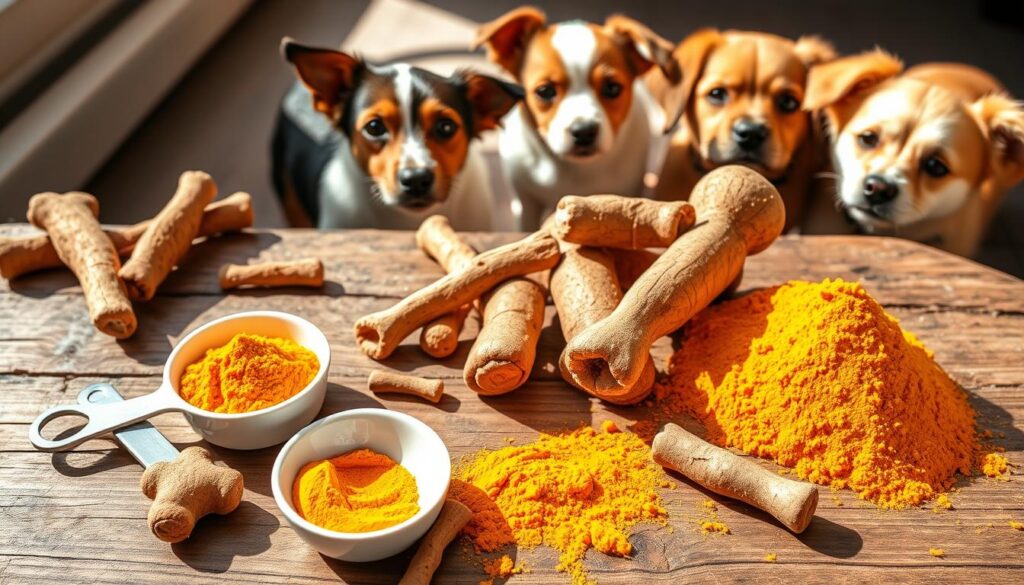As a devoted dog parent, you want the best for your furry friend. You might have heard about turmeric’s benefits. It’s a spice known for its bright color and healing powers. But, can dogs safely eat turmeric, and how can it help them?
Get ready for a journey into the world of turmeric. We’ll see how this golden spice can change your dog’s life.
Table of Contents
Understanding Turmeric and Its Active Compounds
Turmeric (Curcuma longa) is a bright, flowering plant that looks like ginger. Its roots have special compounds called curcuminoids, with curcumin being the most studied. This golden spice gets its color and health benefits from curcumin.
What Makes Turmeric Special
Turmeric has over 300 different compounds, with curcumin being one of the most powerful. It’s been used in Ayurvedic and Chinese medicine for its health benefits. Now, scientists are looking into its uses for dogs’ health and nutrition.
The Role of Curcumin in Turmeric
Curcumin, the main compound in turmeric, gives it its bright orange color and health benefits. It’s a strong antioxidant that fights inflammation, cancer, and protects the brain. This makes it a great natural supplement for dogs.
Different Forms of Turmeric Supplements
Turmeric supplements for dogs are available in powders, oils, and soft chews. Some supplements add ingredients like BioPerine (black pepper extract) or healthy fats to improve curcumin’s absorption. It’s important to pick a trusted brand for quality and safety.
Can Dogs Take Turmeric: Safety and Benefits Overview
Turmeric, a bright yellow spice, is safe for dogs in the right amount. It’s packed with health benefits, making it great for their well-being.
The key part of turmeric, curcumin, fights inflammation and protects against diseases. It helps with diabetes, allergies, arthritis, and even Alzheimer’s in dogs.
- Turmeric works as well as drugs for arthritis, but it’s safer.
- Curcumin may prevent dementia and slow down brain decline in dogs.
- Turmeric reduces allergy symptoms in dogs by lowering IgE and IgG1 levels.
- Curcumin kills cancer cells without harming healthy ones, stopping blood vessel growth, and slowing cell division.
Start with a small amount of turmeric for your dog, about 1/8 to 1/4 teaspoon for every 10 pounds of weight. Always check with a holistic vet to use turmeric benefits for dogs safely and effectively.
The Science Behind Turmeric’s Anti-inflammatory Properties
Turmeric is a bright yellow spice from the Curcuma longa plant. It’s known for its anti-inflammatory and antioxidant effects. The main part of turmeric, curcumin, has been studied a lot. Over 6,000 studies show its health benefits for dogs and humans.
How Turmeric Fights Inflammation
Curcumin, turmeric’s main compound, is as good as ibuprofen for knee osteoarthritis in dogs. It fights inflammation by stopping certain enzymes and molecules. This includes COX-2, NF-κB, and cytokines.
Natural Pain Relief Mechanisms
Curcumin also helps with pain relief. It works with the body’s pain system and other pathways. This makes it a natural pain reliever.
Supporting Joint Health
Turmeric is great for joint health in dogs. Its anti-inflammatory and antioxidant effects help. It keeps bones and joints healthy, supports cartilage, and eases pain from exercise.
| Turmeric Compound | Key Benefits |
|---|---|
| Curcumin |
|
| Piperine (from black pepper) |
|
Adding turmeric to your dog’s diet can help their joints. It’s a natural way to fight inflammation and arthritis.
Turmeric’s Role in Canine Cancer Prevention
Dog owners looking for natural health support might find turmeric helpful. Curcumin, turmeric’s main compound, has shown strong anti-cancer effects. This makes it a good choice for a dog’s diet to help prevent cancer.
Over 6,000 studies have looked into turmeric’s health benefits for dogs. Curcumin, turmeric’s key ingredient, has strong anti-inflammatory effects. It’s as effective as ibuprofen. Turmeric also has antioxidants that can stop cancer from forming in dogs.
Curcumin acts as a natural apoptogen, potentially killing cancer cells while preserving healthy ones. Research in the Journal of Veterinary and Comparative Oncology and BMC Veterinary Research backs curcumin’s anti-cancer effects. It can stop tumor cells from moving and binds to proteins at the cellular level. This makes turmeric a great natural supplement for cancer prevention and treatment in dogs.
Before adding turmeric to your dog’s diet, talk to a holistic vet. They can help with the right amount and watch for any drug interactions. Turmeric can be too warm for dogs sensitive to heat. Still, it’s a powerful way for pet owners to support their dogs’ health and happiness.
Digestive Health Benefits for Dogs
Turmeric, with its active compound curcumin, offers many benefits for dogs’ digestive health. This spice can improve gut function, manage digestive disorders, and support healthy digestion in dogs.
Improving Gut Function
Turmeric is known for its anti-inflammatory properties. It can reduce inflammation in the gastrointestinal tract. This helps the gut lining and improves nutrient absorption, leading to better digestive function.
The antioxidant capabilities of curcumin also support a healthy gut microbiome. This fosters the growth of beneficial bacteria.
Managing Digestive Disorders
Dogs can have various gastrointestinal issues like irritable bowel syndrome (IBS), inflammatory bowel disease, and ulcerative colitis. Turmeric can help alleviate symptoms of these conditions. Its anti-inflammatory and antibacterial properties manage inflammation, reduce discomfort, and restore balance in the digestive system.
Supporting Healthy Digestion
Turmeric also supports overall digestive health in dogs. It stimulates the production of digestive enzymes and bile. This enhances nutrient absorption, promoting better digestion and utilization of nutrients in a dog’s diet.
Additionally, turmeric’s prebiotic effects support the growth of beneficial gut bacteria. This improves digestive function and overall well-being.
By adding turmeric to a dog’s diet, pet parents can support their canine companions’ digestive health. This ensures they enjoy optimal gut function, manage digestive disorders, and maintain a healthy, balanced digestive system.
Proper Dosage and Administration Methods
Finding the right turmeric dosage for dogs is key to their safety and health benefits. Dogs should get 1/8 to 1/4 teaspoon of turmeric per 10 pounds of body weight each day. For bigger dogs, you might need to give more but in smaller amounts throughout the day. This helps with better absorption and tolerance.
There are many ways to give dogs turmeric. You can use grated organic turmeric root, essential oils with CBD, or turmeric powder. Making a “golden paste” with turmeric powder, black pepper, coconut oil, and water is also popular. Start with 1/4 teaspoon 2-3 times a day and increase as needed. Mix it into your dog’s food.
| Dog Size | Turmeric Dosage (Powder) | Turmeric Capsules (97% Pure – 250mg) |
|---|---|---|
| Small Dogs (under 30 lbs) | 1/8 to 1/4 teaspoon per day | 1 capsule once daily |
| Medium Dogs (30-60 lbs) | 1/4 to 1/2 teaspoon per day | 1 capsule twice daily |
| Large Dogs (60-90 lbs) | 1/2 to 1 teaspoon per day | 2 capsules twice daily |
Always talk to your vet before adding any new supplements to your dog’s routine. They can give advice tailored to your dog’s specific needs and health.

Combining Turmeric with Other Supplements
Using different supplements together can be more effective than one alone. Turmeric and CBD oil are a great pair. Turmeric has curcumin, and CBD comes from hemp. Together, they offer better anti-inflammatory and pain relief for dogs.
B-Caryophyllene, found in both cannabis and curcumin, helps reduce pain and inflammation. Mixing turmeric and CBD boosts their effects. This combo fights joint pain and supports overall health.
Synergistic Effects with CBD
Studies show turmeric and CBD work better together. They enhance each other’s benefits, helping manage pain and improve joints. This is great for older dogs or those with chronic pain.
Benefits of Black Pepper Addition
Black pepper is also good with turmeric. Its piperine boosts curcumin’s absorption. Adding a bit of black pepper, like in Pet Parents® Turmeric & Curcumin SoftSupps®, makes turmeric more effective.
Adding these supplements to your dog’s routine can improve their health. Always talk to your vet before adding new supplements.
Potential Side Effects and Precautions
Turmeric is usually safe for dogs, but some might have minor side effects. These can include upset stomachs, constipation, or allergic reactions. Since turmeric can raise body temperature, be careful with dogs that easily get too hot. Also, dogs with kidney stones or diabetes should be cautious.
When adding turmeric to your dog’s diet, start with a small amount. Watch how they react and slowly increase the dose. Always talk to your vet before giving turmeric to your dog, especially if they have health issues.
- Potential side effects: Gastrointestinal upset, constipation, allergic reactions
- Caution with dogs prone to overheating, kidney stones, or diabetes
- Start with small amounts and gradually increase the dose
- Consult your veterinarian before introducing turmeric to your dog’s diet
Studies show that turmeric, especially curcumin, has strong anti-inflammatory effects. It’s as good as some drugs but without the side effects. This makes it a great natural option for dogs with inflammation or pain.
Even though turmeric is mostly safe, it’s key to be careful and check with your vet. This ensures it’s good for your dog’s specific needs and health. By adding it slowly and watching for any bad reactions, you can help your dog enjoy its benefits.
Making Golden Paste for Dogs
If you want to add turmeric’s benefits to your dog’s diet, golden paste is a great choice. It’s made with turmeric powder, black pepper, and healthy fats. This mix creates a supplement that boosts your dog’s health.
Required Ingredients
- 1/2 cup organic turmeric powder
- 1 teaspoon ground black pepper
- 1/4 cup coconut oil or ghee
- 1/2 cup water
Preparation Steps
- In a small saucepan, mix the turmeric powder, black pepper, and water.
- Cook it over medium heat, stirring often, until it thickens into a paste, about 10 minutes.
- Take the pan off the heat and mix in the coconut oil or ghee.
- Let the golden paste cool down before putting it in an airtight container.
Storage Tips
After it cools, store the golden paste in the fridge for up to two weeks. For longer storage, freeze it in an airtight container for up to two months. To use, thaw it in the fridge overnight.

Start with a small amount, no more than 1/4 teaspoon per day. Always talk to your vet before adding new supplements to keep your dog safe and healthy.
Choosing the Right Turmeric Supplement
Finding the best turmeric supplements for dogs is key. Look for products made just for dogs. Pet Parents® Turmeric & Curcumin SoftSupps® is a great choice. It has organic turmeric powder for dogs and other ingredients to help it work better.
Make sure the supplement has BioPerine® (black pepper extract). It helps your dog’s body use curcumin better. Stay away from supplements with extra stuff like fillers or artificial additives. These can hurt your dog more than help.
Talking to a vet is a must. They can help pick the right turmeric supplement and how much to give your dog. They know what’s best for your dog’s health, like fighting inflammation or joint pain.
- Choose products formulated specifically for canine use, like Pet Parents® Turmeric & Curcumin SoftSupps®
- Look for supplements with additional ingredients to enhance absorption, such as BioPerine® (black pepper extract)
- Opt for high-quality, organic turmeric powder for dogs and avoid unnecessary fillers or artificial additives
- Consult with a veterinarian to determine the most appropriate supplement and dosage for your dog
By picking the right turmeric supplement, you can help your dog feel better. This ancient remedy can really help your furry friend’s health.
Real Success Stories: Dogs and Turmeric
Pet owners have shared positive experiences with turmeric supplements for their dogs. A German Shepherd Dog’s owner noticed their fussy pet loved Pet Parents® Turmeric & Curcumin SoftSupps®. A Lab mix’s owner saw their dog’s shoulder pain improve after six months of turmeric.
Turmeric, known for its health benefits, is popular among pet owners. It has anti-inflammatory and antioxidant properties. The compound curcumin in turmeric has been studied for its health benefits.
A dog owner said, “My German Shepherd loves Pet Parents® Turmeric & Curcumin SoftSupps®. He’s more mobile and healthy since we started turmeric.” Another owner mentioned, “My Lab mix had shoulder pain. But after six months of turmeric, he’s more active and comfortable.”
These stories show turmeric’s potential in supporting dog health. Always talk to a vet before adding turmeric to your dog’s diet. Follow the recommended dosage for your dog’s safety.
Conclusion
Turmeric has many health benefits for dogs, like reducing inflammation and boosting the immune system. It can also help with joint health and digestion. But, always add it slowly and watch for any bad reactions.
Research shows turmeric can help with many health issues in dogs, like arthritis and allergies. It can even improve their skin and brain health. Adding turmeric to your dog’s diet can make them feel better and live longer.
Before giving turmeric to your dog, talk to a holistic vet. They can help figure out the right amount for your dog. With the right advice, turmeric can greatly improve your dog’s health and life.

